2021-9-16
Rina Liu /photo courtesy of Hu Chun-yuan /tr. by Phil Newell
中文版
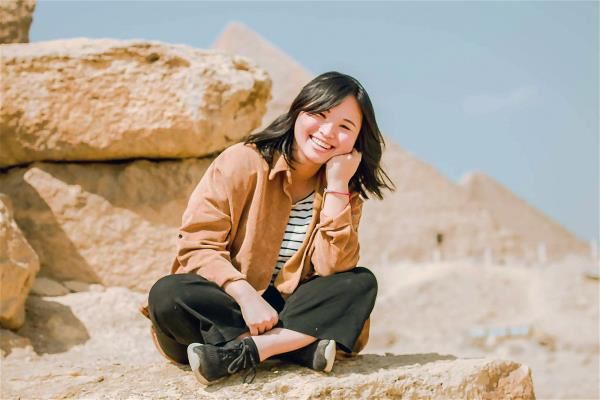
Born in 1995, Hu Chun-yuan, now 26, was a studious child who before entering university “didn’t pay attention to anything outside the classroom window.” “When I was in high school, the ‘Arab Spring’ broke out in the Middle East and North Africa.” But for high-school students, major international events were just text that scrolled by on the TV news.
“Like most Taiwanese, when I saw news about the violence in those countries of course I felt sad, but these were events very remote from Taiwan, and even more remote from a high-school student like myself.” It was only three years later, after she entered the Department of Chinese Literature at National Cheng Kung University, that everything changed for Hu, when her application was accepted by the Ministry of Foreign Affairs to join the International Youth Ambassadors Exchange Program, and she took her first steps outside the country.
When we first meet Hu Chun-yuan, who has been working to support refugees for some time now, her smiling expression reveals her staunch willpower. When asked “Why do you focus on refugees?” her eyes shine as she inquires in turn, “Do you know the actual definition of the word ‘refugee’?”
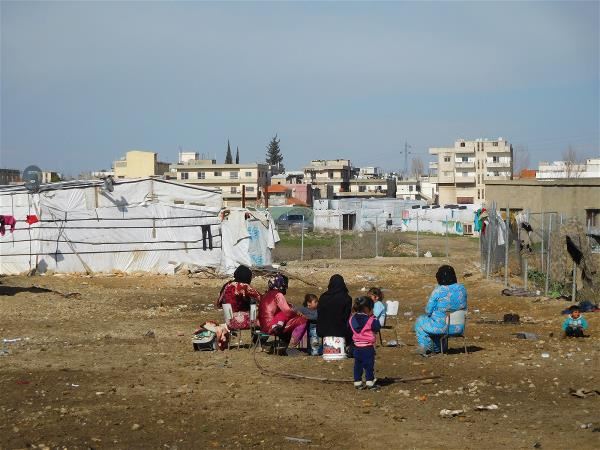
Who are refugees?
“The 1951 Convention Relating to the Status of Refugees and its 1967 Protocol apply to persons seeking asylum who have a specific nationality, or who are stateless,” says Hu, as she rattles off from memory: “Under the convention and protocol, a refugee is any person who, ‘owing to well-founded fear of being persecuted for reasons of race, religion, nationality, membership of a particular social group or political opinion, is outside the country of his nationality and is unable or, owing to such fear, is unwilling to avail himself of the protection of that country; or who, not having a nationality and being outside the country of his former habitual residence, is unable or, owing to such fear, is unwilling to return to it.’”
Hu asks, “Doesn’t this feel very remote? At first I thought so too. I had heard the word ‘refugee,’ but didn’t have any feelings about it.” During her youth ambassadorship, Hu’s purpose in going abroad was to do youth diplomacy. “My duties as a youth ambassador inspired me to learn more about the world.” She was changed by meeting war refugees while on a trip she took as a university student. “I got to know many refugees, and I saw refugee camps and communities. Once a stun grenade went off two meters away from me.” This was her first brush with the fear of death, and “the word ‘refugees’ suddenly weighed upon me.”
Having grown up in free and democratic Taiwan, the first question that arose in Hu’s mind was, “Who are refugees?”
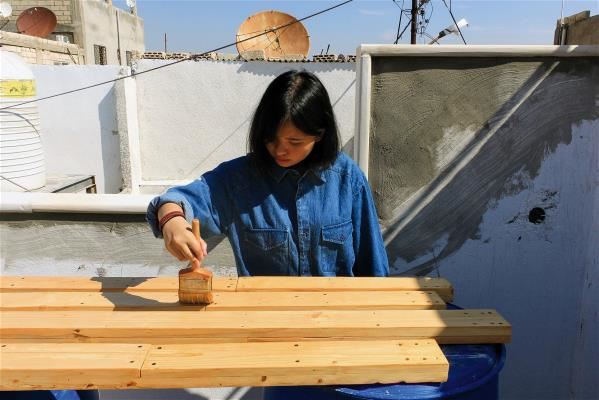
Starting as a youth ambassador
After joining the International Youth Ambassadors program as a college freshman back in 2014, Hu traveled to Canada, the United States, and Belize, and she realized she had a boundless thirst for knowledge about the world.
After her term as a youth ambassador ended, through the “W.island” program Hu turned her attention to the problems faced by migrant workers and long-term immigrants in Taiwan. She worked hard at part-time jobs to raise money and, with four other National Cheng Kung University students, went to the hometowns of three immigrants from Vietnam to make a documentary film about their families.
“After making the documentary, I discovered a discount airplane ticket from Thailand to Berlin that was incredibly cheap—it only cost NT$10,000 or so.” Even today Hu believes that this was Fate’s way of enabling her to make a connection with Germany. At the time, she never dreamed that this journey would completely transform her future.
The Syrian Civil War has been going on for more than ten years, and fighting has only intensified over time. It already has the second highest death toll of any war in the 21st century. When Hu went to Berlin, she saw many Middle Eastern people, and met a young Syrian man who brought her to where he and his people were living: a refugee shelter. Using very basic English, the young man explained to Hu: “Our country is at war. We fled here, and Germany gave us shelter under the Refugee Convention.”
Hu became friends with the refugees. In the course of their interactions, there were people who received phone calls telling them that family members who were still in Syria had been killed by bombing or in combat there. “Death can come at any time. It turns out that simply surviving is very difficult.”
Seeing the assistance provided to refugees by Europe, the US, Japan, and Korea, Hu was “startled by the vast distance between refugees and the people of Taiwan.” Besides feeling deep sympathy for the people displaced by war, Hu began to feel a sense of mission growing deep in her mind. “What pushed me to become what I am today were profound pangs of conscience and frustration. I began to ask myself: What can I and my country do for refugees?”
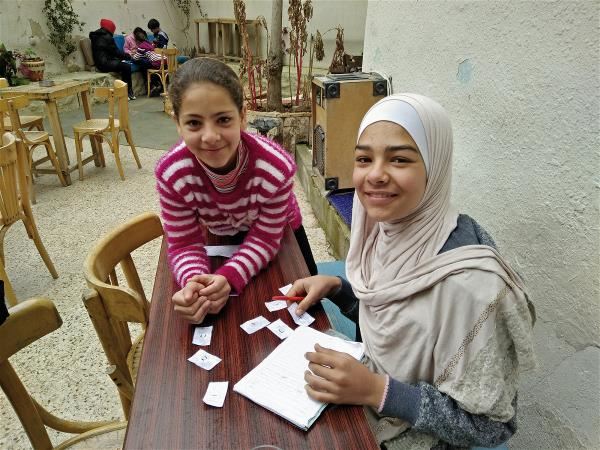
Pain and kindness
After Hu left Berlin, she travelled to Jordan, a country with more than 750,000 displaced persons from over 60 countries. There she worked as a volunteer at a local non-governmental organization, the Amman Center for Human Rights Studies. Next she headed to Lebanon, which had been in conflict with Israel for over a decade. “Because Lebanon is only one-third the size of Taiwan, I wanted to see how they dealt with refugees.” The first thing she wondered was whether Taiwan could become an asylum country.
Hu visited the Jerash Camp in Jordan, a refugee community that was set up more than 50 years ago after the Third Arab‡Israeli War—the Six-Day War of 1967. “The refugees live very close to their places of origin, but those places feel thousands of miles away, and perhaps they won’t be able to return for generations.” Many refugees are not recognized as citizens in their asylum countries. “They live there, but they don’t belong there.” The problem of the self-identity of refugees, passed on from generation to generation, has become difficult to resolve.
Once when Hu was in the city of Hebron in Palestine, the military mistook her for a foreign journalist, and tear gas and stun grenades were thrown in her direction; she even encountered a “skunk” vehicle spraying foul-smelling water at protestors. At that moment, “the first thing I thought of wasn’t death, but rather that this was just an ordinary Friday for the local people.”
Although it is difficult for a foreigner to win the trust of refugees, it is commonplace to receive acts of kindness from them despite their own difficulties. “Once while working in Sweden I saved enough money to go backpacking. I ended up getting lost and was wandering helplessly on a seemingly endless road.” A family of people of Middle-Eastern appearance who drove by kindly gave her a lift to the train station. “Along the way we chatted a bit. They were refugees who had come to Sweden seeking asylum, and had lived there many years, taking jobs anywhere they could to save a little money.” But at the train station the mother of the family spent nearly NT$4000 to buy this East-Asian girl whom they had just met a train ticket to the capital. “I never thought I would receive such an act of kindness, when they themselves clearly did not have a lot.”
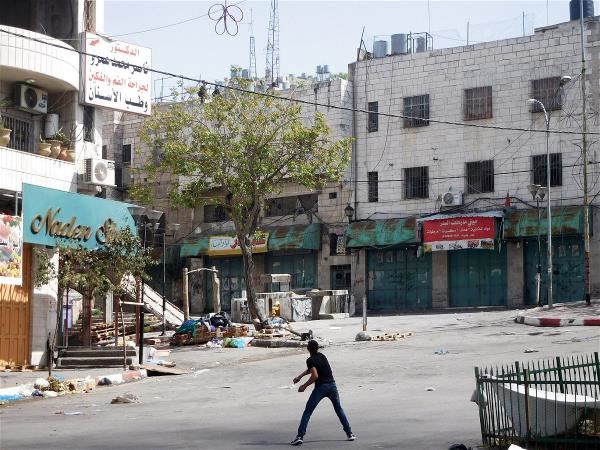
Do you have any questions?
After returning to resume classes at university, the highly energetic Hu began to search for various programs that would enable her to continue to explore the world. In 2016 she applied to the Ministry of Education to join the College Student International and Experiential Learning Program, and was accepted for her plan to look into the state of Chinese language learning in Estonia and to visit Taiwan studies institutes in Slovenia and Lithuania.
Hu has visited quite a number of Taiwan’s representative offices overseas. In the summer of 2016, when she went to the Taipei Representative Office in Budapest, Hungary and met with then head of mission Tao Wen-lung, these words of his became engraved in her mind: “Do you have any questions?”
Tao quickly answered all the questions that Hu had prepared for her visit. Then, rather than continue with polite smalltalk he again asked her, “Do you have any questions?” Tao went on to explain: “In today’s society, it’s not difficult to find information; what is difficult is formulating the right questions.”
Thereafter, Hu frequently asked herself “Do you have any questions?” and this is her query for the world. The phrase “always seek knowledge”—ASK—has become her watchword, which she reminds herself of constantly. “By asking the right questions, I found my dream in life.” Hu’s face shines with youthful radiance as she says: “My dream is not to achieve things for myself, but to help others.” She decided to specialize in international refugee issues and went to University College London to study for a master’s degree in Education and International Development.
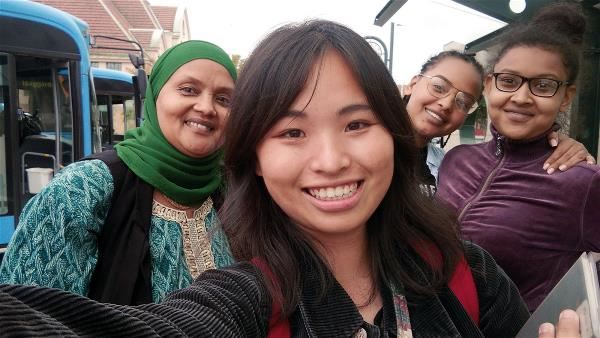
Pleading for asylum seekers
There are many types of refugees who seek asylum. Hu devotes most of her attention to war refugees and LGBTQ refugees. “There are many refugees of these two types, but little in the way of resources for them.” Many countries are willing to provide asylum to the huge number of war refugees, whereas gender and sexuality refugees are a special group of refugees generated by the rise of gender consciousness in recent years and oppression of LGBTQ communities in many countries. “It is often difficult for them to find asylum countries that tolerate gender and sexual diversity, yet Taiwan is one of the top countries in the world in terms of gender and sexual diversity.”
Shortly after earning her MA and returning to Taiwan, Hu founded a refugee advocacy group called Refugee 101 Taiwan.
Hu travels widely to lecture, and the organization offers courses that give participants an understanding of refugee-related law and the situation of refugees. Moreover, Hu works pro-actively with overseas refugee organizations and the Taiwan Association for Human Rights to create opportunities for interactions between Taiwanese and refugees and explore the possibility of refugees being granted asylum in Taiwan. The refugee problem cannot be improved or changed overnight, and Hu recognizes that she has a very long way to go.
When asked what keeps her inspired to carry on her work into the future, Hu says in her own special gentle tone of voice: “The reason I wanted to be an International Youth Ambassador was that I wanted to introduce Taiwan to the world as ‘T.A.I.W.A.N.,’ which stands for ‘The Amiable Individuals Welcome All Nations.’ I hope Taiwan can become this kind of country—that is my motivation.”
Hu Chun-yuan feels a great ambition for her motherland of Taiwan. “I want to feel proud of a Taiwan that can continually improve, and to be proud to be Taiwanese.”
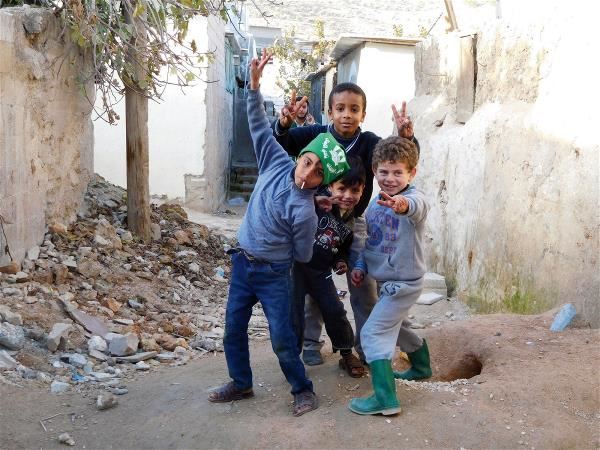
Article and photos courtesy of Taiwan Panorama September 2021




